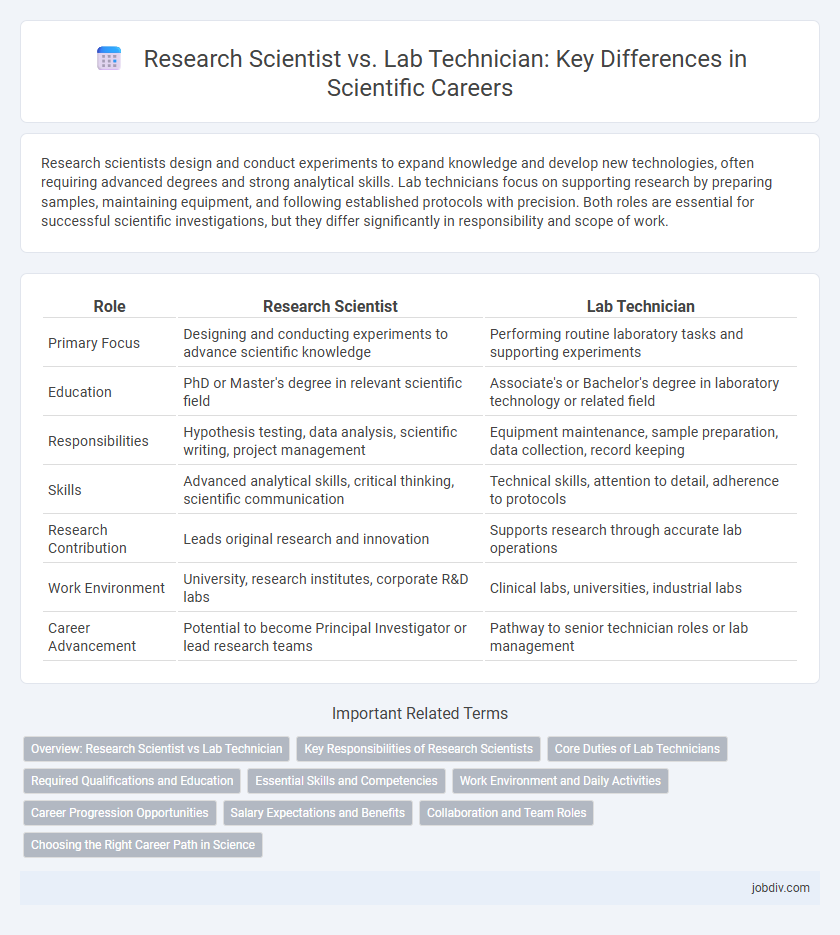Research scientists design and conduct experiments to expand knowledge and develop new technologies, often requiring advanced degrees and strong analytical skills. Lab technicians focus on supporting research by preparing samples, maintaining equipment, and following established protocols with precision. Both roles are essential for successful scientific investigations, but they differ significantly in responsibility and scope of work.
Table of Comparison
| Role | Research Scientist | Lab Technician |
|---|---|---|
| Primary Focus | Designing and conducting experiments to advance scientific knowledge | Performing routine laboratory tasks and supporting experiments |
| Education | PhD or Master's degree in relevant scientific field | Associate's or Bachelor's degree in laboratory technology or related field |
| Responsibilities | Hypothesis testing, data analysis, scientific writing, project management | Equipment maintenance, sample preparation, data collection, record keeping |
| Skills | Advanced analytical skills, critical thinking, scientific communication | Technical skills, attention to detail, adherence to protocols |
| Research Contribution | Leads original research and innovation | Supports research through accurate lab operations |
| Work Environment | University, research institutes, corporate R&D labs | Clinical labs, universities, industrial labs |
| Career Advancement | Potential to become Principal Investigator or lead research teams | Pathway to senior technician roles or lab management |
Overview: Research Scientist vs Lab Technician
Research scientists design and conduct experiments to advance scientific knowledge, often requiring advanced degrees such as a PhD, and they analyze data to develop new theories or products. Lab technicians support research by maintaining equipment, preparing samples, and executing routine tests, typically holding technical diplomas or associate degrees. The primary distinction lies in the scope of responsibilities and independence, with research scientists leading investigative projects and lab technicians providing essential operational assistance.
Key Responsibilities of Research Scientists
Research scientists design and conduct experiments to advance knowledge in specific scientific fields, analyze complex data using statistical and computational methods, and publish findings in peer-reviewed journals. They develop hypotheses, create experimental protocols, and collaborate with interdisciplinary teams to drive innovation and solve scientific challenges. Research scientists also secure funding through grant proposals and ensure compliance with ethical and safety standards in laboratory research.
Core Duties of Lab Technicians
Lab technicians perform essential tasks such as preparing samples, operating laboratory equipment, and conducting routine tests to support research experiments. They maintain accurate records of procedures and results, ensuring data integrity for scientific analysis. Their role is critical in facilitating efficient workflow and enabling research scientists to focus on experimental design and data interpretation.
Required Qualifications and Education
Research scientists typically require advanced degrees such as a master's or Ph.D. in their specialized scientific field, emphasizing extensive knowledge in experimental design and data analysis. Lab technicians usually hold an associate or bachelor's degree in laboratory technology or related disciplines, focusing on practical skills for maintaining equipment and conducting routine tests. Both roles demand proficiency in laboratory safety protocols, but research scientists often engage in independent project development and interpretation of complex scientific data.
Essential Skills and Competencies
Research scientists require advanced analytical skills, proficiency in experimental design, and expertise in data interpretation to drive innovation and scientific discoveries. Lab technicians must demonstrate strong technical abilities, precision in following protocols, and competency in operating laboratory equipment to ensure accurate and reliable results. Both roles demand critical thinking, attention to detail, and knowledge of safety standards, but research scientists often lead project development while lab technicians support day-to-day experimental activities.
Work Environment and Daily Activities
Research Scientists typically work in controlled laboratory settings or field environments, focusing on designing experiments, analyzing data, and publishing findings to advance scientific knowledge. Lab Technicians operate in laboratory facilities performing routine tasks such as sample preparation, equipment maintenance, and data collection to support experimental procedures. Both roles require adherence to safety protocols, but Research Scientists engage more in hypothesis-driven projects while Lab Technicians ensure operational efficiency in ongoing experiments.
Career Progression Opportunities
Research Scientists typically have broader career progression opportunities, advancing into senior research roles, project management, or academic positions due to their advanced expertise and often doctoral degrees. Lab Technicians usually progress within technical or supervisory roles, supporting research activities but with limited access to independent project leadership or high-level scientific decision-making. The distinction in educational background and responsibility scope significantly influences the trajectory and potential for advancement in scientific careers.
Salary Expectations and Benefits
Research scientists typically earn higher salaries than lab technicians, with median annual wages around $85,000 compared to $45,000, reflecting their advanced degrees and specialized expertise. Research scientists often receive comprehensive benefits, including funding for professional development, research grants, and opportunities for publishing, while lab technicians usually have standard health insurance and retirement plans. Salary growth potential is greater for research scientists due to leadership roles and the ability to secure competitive grant funding.
Collaboration and Team Roles
Research scientists lead hypothesis-driven investigations and design experiments, providing strategic direction and interpreting complex data to advance scientific knowledge. Lab technicians support research activities by managing laboratory equipment, preparing samples, and maintaining precise experimental protocols, ensuring operational efficiency. Effective collaboration between research scientists and lab technicians enhances data accuracy, accelerates project timelines, and fosters innovation within multidisciplinary research teams.
Choosing the Right Career Path in Science
Research scientists lead experimental design and data analysis to advance scientific knowledge, often requiring advanced degrees like a PhD. Lab technicians execute routine tests and maintain laboratory equipment, typically requiring an associate or bachelor's degree in science. Choosing between these roles depends on desired responsibility level, career goals, and interest in conducting independent research versus supporting experimental operations.
Research Scientist vs Lab Technician Infographic

 jobdiv.com
jobdiv.com